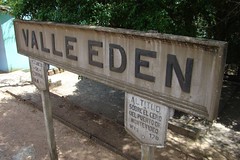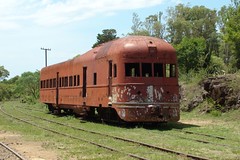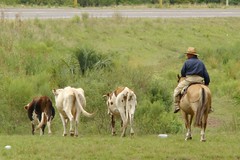Available in Spanish: Valle Edén
On the day after our arrival, Tacuarembó continued to feel asphyxiatingly hot and humid. We woke up deliciously later that many other days, with no appointments for the morning, and once in the street we walked with resignation following the shaded parts of the sidewalk.
 There are two museums in Tacuarembó: the Historical and the Geoscience Museum. None of them is notable, but they were OK for a brief visit. None had air conditioning. The lady who sat (in supreme boredom) at the reception of the Geoscience Museum made a note out of that, while she guided us around a room where labels made her explanations wholly unnecessary.
There are two museums in Tacuarembó: the Historical and the Geoscience Museum. None of them is notable, but they were OK for a brief visit. None had air conditioning. The lady who sat (in supreme boredom) at the reception of the Geoscience Museum made a note out of that, while she guided us around a room where labels made her explanations wholly unnecessary.Near noon we headed for the bus terminal to wait for the bus that would take us to Valle Edén, 23 km from Tacuarembó, a recommended touristic spot which promised lots of green, water and cool, besides being the seat of the Carlos Gardel Museum. Said museum showcases abundant proofs that Gardel, the most famous of all tango singers, was born in Tacuarembó, the bastard son of a promiscuous military man, and not in France... although those proofs are only considered clearly true by the people of Tacuarembó.
The bus came on time, and after about 40 minutes it left us at the entrance to Valle Edén, under a sky pouring sunlight on us. First mistake: the museum is one kilometre from the entrance; if we'd asked for it the bus would've taken us closer. The walk we had to endure was the first step of the realization of what would become painfully obvious later: that Valle Edén was not a summer paradise, unless you have a fast means of transportation (and with A/C).
 The museum was an oasis of coolness, a house with lots of pictures and copies of historical documents about Carlos Gardel, and tango in the background. We tarried there, on my part without any interest in the hellish outside. Once the tour was over, we sat down to have lunch beside the museum, under some trees. We visited what's left of the Valle Edén train station, where a couple of locomotives are abandoned, giving the visitor a false sense of security (a train came by at full speed a while later). Then, map in hand, I went and inquired about the paths to take in order to reach the curiously named places noted as attractions.
The museum was an oasis of coolness, a house with lots of pictures and copies of historical documents about Carlos Gardel, and tango in the background. We tarried there, on my part without any interest in the hellish outside. Once the tour was over, we sat down to have lunch beside the museum, under some trees. We visited what's left of the Valle Edén train station, where a couple of locomotives are abandoned, giving the visitor a false sense of security (a train came by at full speed a while later). Then, map in hand, I went and inquired about the paths to take in order to reach the curiously named places noted as attractions.There's nothing, nothing in Valle Edén that is close to anything else. The nearest touristic spot was about 7 km from us, maybe feasible for people in better shape or in more moderate temperatures, but not for us two. We didn't recoil from the challenge, though. Following the directions given to me by a local guide, we started walking toward the Gruta de los Chivos (Goats' Cave), but soon we realized that either the map or the guide's tips, or most likely both, bore no relationship to reality. We went back to the starting point, beside a rocky stream, shallow and full of green mud (described in the touristic brochure as having "crystal-clear waters") and near a suspended bridge (which we dared not climb).
By then it was clear the one good idea I had when we decided to try Valle Edén was insisting that we take two litres of cold water with us, despite its weight and the fact that it meant forfeiting our afternoon mate. There's no need, I guess, to note that anyway drinking hot mate at 40 °C was not a priority. We were sweating just by sitting down. And sitting we would have to stay, because the only bus back to Tacuarembó would come after 7 PM. And it was 2.
 Faced with the prospect of a five-hour wait in that open-air sauna (which was mercifully getting cloudy), we exhausted all conversation topics, including how the hell we'd gotten there and why the guy at Tourist Info didn't explicitly tell us not to go. It was truly very very hot (I can't help repeating that) and we had to be careful with our water.
Faced with the prospect of a five-hour wait in that open-air sauna (which was mercifully getting cloudy), we exhausted all conversation topics, including how the hell we'd gotten there and why the guy at Tourist Info didn't explicitly tell us not to go. It was truly very very hot (I can't help repeating that) and we had to be careful with our water.For a good while we considered going up to the road and hitchhike. But we hadn't seen any hitchhiking in Uruguay, least of all in Tacuarembó. Maybe it wasn't customary, maybe here in the deep interior of the country nobody had that custom. The road didn't look very crowded to us. And beside the road there wouldn't be a lot of convenient waiting places in the shade. We decided against hitchhiking. What to do then?
I'd brought a book, mostly because I had a lot of room in my backpack, thinking maybe we'd lie down in the cool grass in that paradise which Valle Edén had promised to be. I took the book out and started reading, but right away I realized that Marisa, who hadn't brought her own book, would get even more bored watching me read. So I asked her if she wanted me to read aloud. And that was, I think, the second good idea I had in Tacuarembó. The book was Desert Memories, by Ariel Dorfman, an Argentine-born Chilean exilee settled in the United States, and it was about his trip in the north of Chile for a close-up investigation of the history of the towns that sprang up in the late 19th century and early 20th beside the saltpeter mines. Not only was it entertaining and moving, but ideal for travelers like us, ideal to forget the heavy heat, to spend the hours, to stop after a couple of paragraphs and chat and discuss.
At one point when the time to return was still far away and not even the book or the conversations it prompted were enough anymore to keep us calm, we rose and went towards the road. We'd escaped from the dead hours and from our own tempers and we even had some water left, which we now took in little sips. The weather was better as well: the sky was gray and gusts of promising cool wind blew. I started to fear a storm would fall upon us.
At about 6:30 the bus came by, headed for Tambores, the end of its route, from where it would have to return and fetch us. From that moment on the wait became easier. One hour later we saw the same bus come towards us, we signaled it, got in and sat down, so happy.
With almost chronometric precision, it started to rain as soon as we neared Tacuarembó. We had no food for the night, and I had to phone a woman in Paysandú to confirm our reservation for the next day. We ran along the streets; sweating from the day and wet from the rain we went to a supermarket to buy some stuff, and managed to find a public phone. The whole night was a deluge, and thus the coolness we'd wished for the whole day finally came.
To be continued...













No comments:
Post a Comment
Note: Only a member of this blog may post a comment.